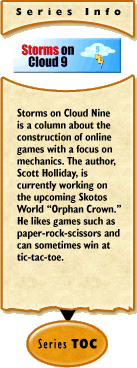 Storms on Cloud 9 #19: Storms on Cloud 9 #19:
The Competition
by Scott Holliday
2003-09-22
Just a cursory look at the computer games industry can be somewhat discouraging. There are literally hundreds, maybe thousands, of games currently in development. If history is any indicator, many of these will be utter failures. Even if you narrow the field down to only include massively multiplayer online games, the list is still a long read. Stratics keeps a good list of upcoming MMO games. The list is a bit dated, but the number of cancellations should give any developer pause.
With this many games due around the corner, what does that say to the future designer or developer? They can't all succeed. Chances are, many will be cancelled early on. Others will fail to sell enough to even make back their investment. Others will hang on for years with small audiences, just making the bills. And then just a few will become wildly popular, and so inspire the next set of hopefuls further down the road.
Assuming you are the designer, or developer, or publisher, how do you know whether you've chosen the right horse? Considering the costs of developing a MMOG, you'd be better off with a cancellation rather than a failure. But if you never try, you'll never succeed. So what factors should you be looking for?
- Resources : This one is obvious. Without decent funding, a game doesn't have much of a chance. If you can't pay people's salaries, you can't expect much to get done. Similarly, if you don't buy advertising, who do you blame when nobody has heard of your game?
- Recognition : Known worlds have several important advantages. Whether your setting comes from the theatres, the bookstore, or a sequel to a previous game, you already have an established fan-base. Additionally, you already have an accepted canon of material to work from. The only real fear is that your decisions alienate your fan base such that it hurts you more than it helps you.
- Technology : Advances in technology will constantly be changing the face of gaming. Continuous improvements in graphics and physics engines are giving games an increasingly high standard to clear. Ten years ago, crude graphics were considered par. Who knows what a gaming machine will look like ten years from now? If it isn't graphics, maybe sound, or even voice communication. Size, memory and speed are a given. Of course, the key will be which games utilize each of these opportunities well. A shoddy job is likely worse than not doing it at all.
- Innovation : This one is the biggest and probably the most important. It's also the hardest to catch. Online gamers are often begging for something new and different. The problem is figuring out WHAT they want when they often aren't even sure themselves. Unfortunately, as you've heard before, ideas are a dime a dozen. Good ideas are only slightly better. Worse, even a good idea is worthless unless it is carefully carried through to completion.
I can't comment much on the other categories. Getting the opportunity to work with full resources, an established setting, or new technology is often determined in advance. Innovation comes from yourself. So what would be innovative? Good question. Every developer on earth is hoping that their idea will be considered innovative (rather than misguided). Hindsight will tell. Looking around, it's pretty easy to see the ideas that other developers are betting on.
- New Genres : Modern, Pirates, Sci-Fi?
- New Focus : Focus on community and group mechanics or strategy rather than individual brute force?
- New Goals : World improvement instead of character advancement?
- New Audiences : The RPG market is full, what about MMO RTS or sports games?
- New Mechanics : Replacing the treadmills, better group interaction?
- Dynamic Worlds : Worlds that continuously rebuild themselves or can be built upon by the player?
Which strategy will be most successful? Knowing my luck, it will probably something that I haven't even noticed. That way people can come back to this column in a few years and get a good laugh. Although, I think if I was a new developer, I'd be hedging my bets and trying out several at once. Which, incidentally, is just what I'm doing...
|

